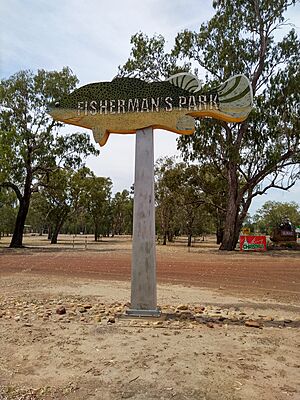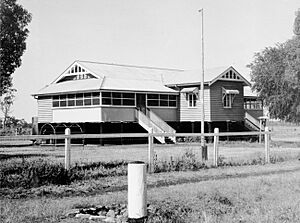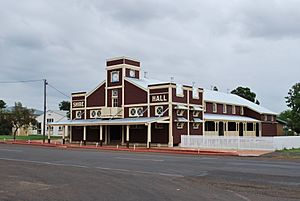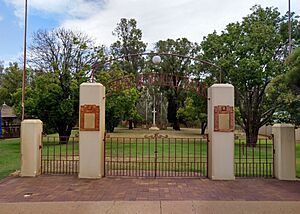Surat, Queensland facts for kids
Quick facts for kids SuratQueensland |
|||||||||||||||
|---|---|---|---|---|---|---|---|---|---|---|---|---|---|---|---|
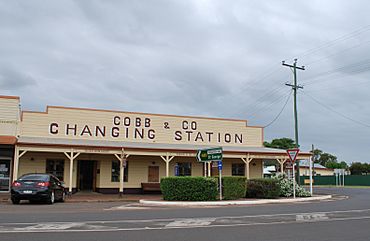
Cobb and Co Changing Station
|
|||||||||||||||
| Population | 402 (2021 census) | ||||||||||||||
| • Density | 191/km2 (490/sq mi) | ||||||||||||||
| Established | 1849 | ||||||||||||||
| Postcode(s) | 4417 | ||||||||||||||
| Elevation | 246 m (807 ft) | ||||||||||||||
| Area | 2.1 km2 (0.8 sq mi) | ||||||||||||||
| Time zone | AEST (UTC+10:00) | ||||||||||||||
| Location | |||||||||||||||
| LGA(s) | Maranoa Region | ||||||||||||||
| State electorate(s) | Warrego | ||||||||||||||
| Federal Division(s) | Maranoa | ||||||||||||||
|
|||||||||||||||
|
|||||||||||||||
Surat is a small country town and area in the Maranoa Region of Queensland, Australia. It is known for its quiet rural life. In 2021, about 402 people lived in Surat.
Contents
Discovering Surat's Location
Surat is located right on the Balonne River. This river is a key part of the town's geography. The town is about 75 kilometres (47 miles) south of Roma. You can find it along the Carnarvon Highway in South West Queensland. Surat is also about 450 kilometres (280 miles) west of Brisbane, the capital city. Further south from Surat, there are areas where oil is found.
A Look Back at Surat's History
The Mandandanji People
The land around Surat has a long history. It is the traditional home of the Mandandanji people. Their language, also called Mandandanji, is an Australian Aboriginal language. The Mandandanji people's land covers a large area. This includes places like Roma, Yuleba, and Surat. It also stretches east towards Chinchilla and south-west towards Mitchell and St George.
Early European Settlement
The first European explorer to officially record visiting this area was Sir Thomas Mitchell. He was the Surveyor-General of New South Wales. His expedition explored the region in 1846.
Soon after, in 1848, sheep and cattle farmers arrived. These farmers were called squatters. Joseph Fleming started a property called Talavera. Thomas Simpson Hall set up several properties, including one named Surat. These properties were along the upper Balonne River. The Mandandanji people did not want their land taken. They strongly resisted the new settlers. The settlers often had to keep armed guards because of this resistance.
In 1849, a government official named John Henry Durbin set up a hut. Within a month, the Mandandanji surrounded his camp. Reports say that Durbin and his police had to use force to break free. In 1850, Roderick Mitchell, Sir Thomas Mitchell's son, took over. He moved the settlement about two kilometres upstream. This new place was named Surat. The Mandandanji continued to resist. They stopped Mitchell's men from building houses. Mitchell used force to make the local Aboriginal people leave. This allowed the first houses in Surat to be built. In 1851, a surveyor named Robert Cooper Bagot drew maps for the town of Surat.
By 1852, the resistance from local Aboriginal people had mostly stopped. This was due to patrols by the Native Police. Thomas Davis, whose son became the writer Steele Rudd, lived in Surat in the early 1850s. He later spoke about the terrible and unfair killings of Aboriginal people that happened during these patrols.
Surat grew slowly at first. By the early 1860s, it still only had three buildings. More public buildings and services started to appear in the 1870s.
Schools and Churches in Surat
The first school in Surat, Surat State School, opened on 23 July 1874.
The All Saints Anglican Church was built from wood and opened in 1879. A new wooden church, St John the Divine Anglican Church, replaced it in 1938. This church was designed by architect Lange Powell. It closed in 2019.
St Peter and St Paul's Catholic Church was built in 1884. It was also made of wood. In 1956, a new church called the Church of the Immaculate Conception was built. Another new brick church with the same name was built in 1965.
St Stephen's Presbyterian Church was built from wood and opened in 1934. It is now used as Surat's Men's Shed. The Kingdom Hall of Jehovah's Witnesses opened around 1985.
Surat's Population Over Time
The number of people living in Surat has changed a little over the years.
- In 2011, the town of Surat had 426 people.
- In 2016, the area of Surat had 407 people.
- In 2021, the area of Surat had 402 people.
Important Historical Buildings
Surat has some buildings that are listed as important historical sites. This means they are protected because of their history. These include:
- The Astor Theatre, located on Burrowes Street.
- The Warroo Shire Hall, found at the corner of Cordelia and William Streets.
Education Opportunities in Surat
Surat State School is a government school for both primary and secondary students. It teaches children from Prep (the first year of school) up to Year 10. In 2018, the school had 97 students.
If students want to continue their schooling past Year 10, they have a few choices. They can study through distance education, which means learning from home. Another option is to attend a boarding school in a larger town or city.
Local Services and Attractions
The Maranoa Regional Council runs a public library in Surat. It is located at 62 Burrowes Street. This library is part of the Cobb & Co. Changing Station complex. The library opened in 1997 and offers free Wi-Fi.
The Cobb & Co. Changing Station complex is a special place. It includes:
- A historic Cobb & Co changing station, where horse-drawn coaches used to stop.
- A freshwater aquarium.
- A museum about the area's social history.
- A theatre and the shire hall.
- The Balonne gallery, which shows local art.
The Roman Catholic Church of the Immaculate Conception is located on Ivan Street.
Media in Surat
The Surat Basin News was a local newspaper for the area. However, it stopped being published in June 2020. This was part of a larger change where many regional newspapers owned by NewsCorp closed down.
Places to Visit
Surat has a war memorial. It is located by the Maranoa River. This memorial honours the local people who lost their lives serving in the Second World War. It is next to the town's water scheme, which was also dedicated to these brave citizens.
Images for kids
 | William Lucy |
 | Charles Hayes |
 | Cleveland Robinson |



